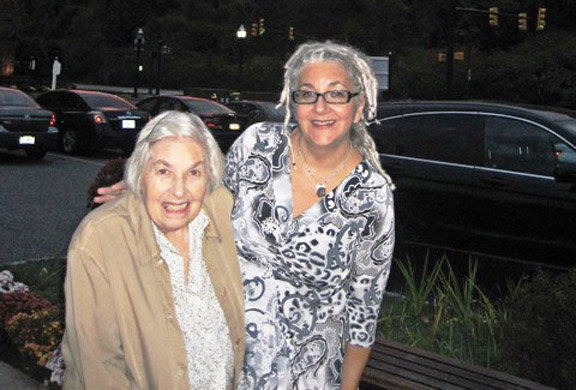“And for every black child whose life has been stolen, there in the midst of the crowd is that little old lady shouting her slogans demanding equality now,” Carla Cook croons jazzlike from a CD compilation of songs written in 1994 by former Weehawken resident and activist legend, Bernice Blohm Diskin. “She despises injustice, but each cause that’s just is her own ‘til victory is won.”
Diskin passed away June 25 after being diagnosed with pancreatic cancer around a month earlier at the age of 91. She left behind countless people whose lives she touched, from fellow activists to students she tutored to the people who worked at the Dunkin Donuts on 48th Street and Park Avenue to whom she supplied progressive documentaries on a weekly basis.
A few years ago, the decision was made to relocate her to a nursing home across the street from her nephew Erich Blohm’s home in Rhinebeck, N.Y., necessitated by Diskin’s progressive memory loss. But during the last of her 33 years living in Weehawken, she still insisted upon her Thursday jaunt to the Union City coffee shop to deliver a new DVD and to discuss the one she had left the week before.
“Have discussions. You’ll both be smarter. Hopefully.” – Bernice Blohm Diskin
____________
“She couldn’t hold forth on the tenets of communism, but that wasn’t who she was,” Blohm explained. “Who she was and what she did came from the heart. For her, communism was a reason for being the humanitarian that she was.”
In the beginning
Diskin was born Oct. 22, 1920 in Jersey City, before her parents relocated the family to Free Acres. Her eight years at the commune both inspired her lifelong passion for activism and apparently her songwriting. While she was there, she composed her first ditty at the age of nine:
“Free Acres, my home, I may roam but I’ll always come home to Free Acres,” she sang during an interview filmed by the Weehawken Historical Society in 2009. “It was a wonderful, beautiful place for a child to grow up.”
The singing led to an attempt at a dancing career, Diskin explained, which she then traded for a brief acting career (“Eventually as a dancer your body says ‘To hell with this!’”) and found herself the only white member of the American Negro Theatre in Harlem in the early 1940s. As an example of the mindset of the times, she said a fellow theatre member approached her and said, “What? You’re white?” though Diskin clearly was.
“You are where you are, and if you weren’t black you wouldn’t be in this theatre,” Diskin said. “It wasn’t even conscious thinking. It was one of those things that comes out of…racism.”
Shortly after, she traded acting for factory work for “the marvelous amount of money of $11.88 per week.”
Eventually, she met her husband Lou in a community peace group and they were married a mere three weeks before he was taken by the very first World War II draft. They were separated for four and a half years, but their marriage lasted 62 years until Lou passed away in 2003.
Life of activism
“Behind any real change, you will find some gray-haired, loud-mouthed broad,” Weehawkenite and 30-year friend of Diskin’s, Mary Ciuffitelli, explained. “When I met Bernice I was just star-struck. I wanted to be just like her, pushing back against ignorance and apathy every day of her life right up until the end.”
Of the hundreds of Washington D.C. rallies Diskin attended, one truly stands out; though for her, each moment was equally historical if it was a part of the fight against racism. She was there for Martin Luther King, Jr.’s momentous mountaintop speech in 1968.
“Racism was fierce,” Diskin said in her interview. “My concept, my family’s concept, my husband’s concept is that we have to work to have peace and friendship in this world. And you don’t have that by saying I’m not going to talk to you because you’re different or I disagree with you. That is nonsense. How are you going to have a friendly world if you’re going to be that way?”
She also went to the first World Youth Festival in 1947 held in Czechoslovakia – which was, ostensibly, not the nation’s favorite country during the height of the McCarthy era – with 350 people from the U.S., and 72,000 from all over the world.
“Red baiting at the time was as common as eating,” Diskin said, but that didn’t stop her. “Just because you think a little bit differently from somebody else you should be punished? It doesn’t make sense to me. Have discussions. You’ll both be smarter. Hopefully.”
Edward S. Majian grew up in Weehawken and met Diskin when she tutored him as a child.
“She was a beacon of love and light,” he said, “But in addition to passing out literature to the adults of her day, she also helped give the gift of literacy to the future. She exemplified the balance between speaking against war and racism and making sure her underprivileged tutorees got a daily dose of carrots and celery. I still sometimes wear her button, which reads ‘No to War. No to Racism.’”
Gennarose Pope may be reached at gpope@hudsonreporter.com
